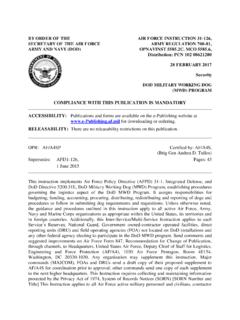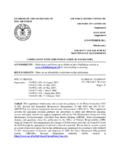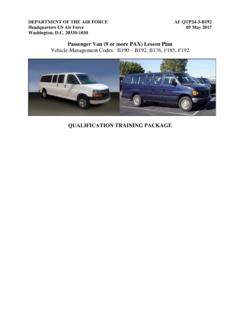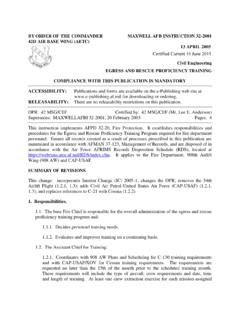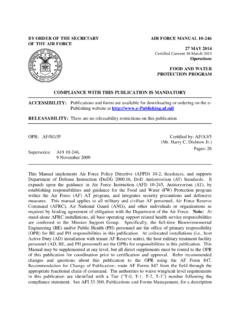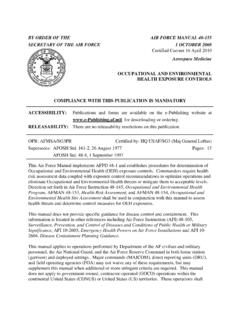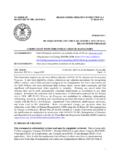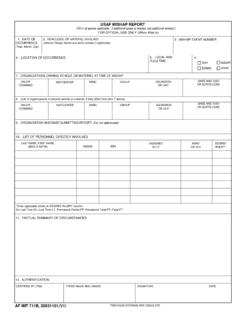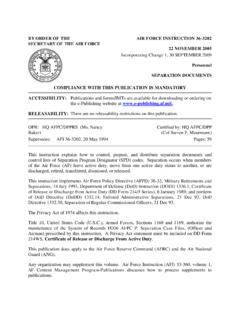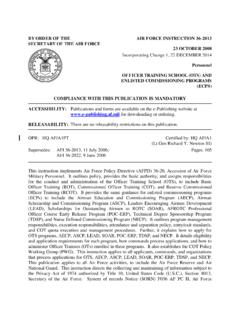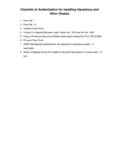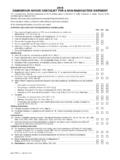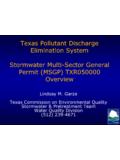Transcription of BY ORDER OF THE COMMANDER AIR FORCE …
1 BY ORDER OF THE COMMANDER AIR FORCE INSTRUCTION 21-201. 62D AIRLIFT WING. 62D AIRLIFT WING. Supplement 16 november 2016 . maintenance munitions management . COMPLIANCE WITH THIS PUBLICATION IS MANDATORY. ACCESSIBILITY: Publications and forms are available on the e-Publishing website at for downloading or ordering. RELEASABILITY: There are no releasability restrictions on this publication. OPR: 62 MXS/MXM Certified by: 62 MXG/CC. (Colonel James A. Clavenna). Pages: 12. Air FORCE Instruction (AFI) 21-201, Conventional munitions management , is supplemented as follows: implements and extends the prescribed policies and procedures governing munitions management in the 62d maintenance Group (62 MXG). The instruction applies to 62d Aircraft maintenance Squadron (62 AMXS), 62d maintenance Squadron (62 MXS), and 62d Operations Support Squadron (62 OSS). All other unit custodians will prescribe to the policies and procedures found in applicable governing documents.
2 Ensure that all records created as a result of processes prescribed in this publication are maintained in accordance with (IAW) Air FORCE Manual (AFMAN) 33-363, management of Records, and disposed of IAW Air FORCE Records Information management System (AFRIMS). Records Disposition Schedule (RDS). Refer recommended changes and questions about this publication to the Office of Primary Responsibility (OPR) using the AF Form 847, Recommendation for Change of Publication; route AF Forms 847 from the field through the appropriate chain of command. (Added) Ensure all vehicles, munitions material handling equipment (MMHE), and support equipment are inspected for serviceability prior to the pickup and delivery of all requested, issued, and turn-in custody munitions to and from the munitions storage area. IAW AFMAN 91-201, chapter 8, ensure explosives loaded on all types of vehicles and handling equipment are stable and secure before movement. Load stability is required for all 2 AFI21-201_62 AWSUP 16 november 2016 .
3 Movements. "Secure" is defined as protecting the load by an effective restraining system. Chock wheels and set parking brakes on explosive loaded vehicles and trailers. Explosive containers must be restrained, blocked, braced, tied down, or otherwise secured to the vehicle to prevent movement, and must not damage explosives or containers. Restraining devices may include chains and binders, cargo nets and tie-down straps, etc. A vehicle loaded with explosives will never be left unattended with the motor running. Vehicles will not be refueled while munitions are on board. Personnel may ride in the cargo compartment of a motor vehicle transporting explosives, as authorized below in this supplement. IAW 91-201 NOTE: Minimum essential personnel and limited quantities of HC/D , and explosives, may be transported together in the cargo area of vehicles, including Metro type vans used on flight lines. No maintenance will be performed on an explosive-loaded vehicle or trailer that would increase the probability of fire or would require the use of heat-producing equipment.
4 (Added) Ensure all required personal protective equipment (PPE) is readily available and utilized. Ensure a radio is available to communicate with the maintenance Operations Center (MOC) or the Command Post. Ensure applicable technical orders (TOs), safety briefing, checklists, and operating instructions are available and utilized at each work site. Ensure explosive operation signs are posted to prevent entry of nonessential vehicles and personnel. Use the applicable portions of the Pre-Task Checklist in Attachment 7 to prepare the Pre-Task Safety Brief. Ensure a pre-task safety briefing is accomplished and documented IAW Attachment 8 of this instruction. Ensure all members are present during the pre-task safety briefing. Ensure all personnel involved in handling, operating, or transporting explosives are properly trained and qualified. Training for applicable course codes will be available on the distance learning center (DLC) website (62 MXG organizations) or with the applicable program manager at the respective squadrons and will be updated by applicable training monitor All personnel involved in the operation will complete course code SAFE 000536, Explosive Safety, and document as is typical for their unit's training ( G081, TBA, or other).
5 This training consists of reviewing and understanding applicable instructions, to include handling. After initial training, this must be completed NLT (no later than) every 15 months (as defined in AFI 91-202, para ). All personnel involved in the transport operation will complete course code SAFE. 000538, Explosive Handling and Transportation Training, and document as is typical for their unit's training ( G081, TBA, or other). This is a two-part training requirement: Part I will consist of reviewing and understanding applicable instructions from course. AFI21-201_62 AWSUP 16 november 2016 3. Part II will consist of a ride-along that includes simulated pick-up, transport, and drop-off procedures, and familiarization of applicable explosives routes. Part II can be accomplished and signed-off by previously trained personnel. (Added) Ensure personnel are authorized to receive munitions via a current CAC, and validated by an AF Form 68, munitions Authorization Record, before transferring possession of munitions items.
6 (Added) Ensure an explosive operations supervisor will be designated for each operation. This individual is in charge of the entire operation, to include pick-up and delivery and will: Determine the location(s) of the operation and identify location(s) during the pre- task safety briefing in Attachment 8. Determine safety requirements and PPE specific to each operation and identify them during the pre-task safety briefing in Attachment 8. Minimize the number of personnel to safely accomplish the explosive operation task as outlined in specified TOs. However, it is recommended a maximum of 10 personnel, in any combination of the below, be allowed in the area during explosive operations. 2 SUPERVISORS (minimum of 1 required). 6 WORKERS. 2 CASUALS (as defined in AFMAN 91-201, para ). Emphasize all applicable warnings, cautions, and notes from safety briefing and applicable item technical orders. Update safety briefing whenever changes occur ( personnel, net explosive weight (NEW), hazardous class/division (HC/D), etc.)
7 Act as approval authority to allow entry into the explosives operations, and immediately provide safety briefing to new members, casuals ( quality assurance (QA), safety, inspector general), and visitors. Ensure operations will be placed on hold when visitors arrive and operations will not resume until visitors depart. Monitor NEW and authorized compatibility group mixing of munitions during explosive operations. (Added) Step-by-step procedures for task accomplishment are located in each item technical ORDER . The applicable technical orders will be identified in the pre-task safety briefing in Attachment 8. (Added) Actions to be taken during an emergency or when abnormal conditions are noted: Personnel will stop the operation, ORDER an immediate evacuation of the area, and relay full details to the MOC or the Command Post. The MOC will initiate the applicable quick reaction checklist (QRC), Explosive Handling Mishap. 4 AFI21-201_62 AWSUP 16 november 2016 .
8 Personnel not directly involved in firefighting or lifesaving actions IAW AFMAN. 91-201 will evacuate. When a lightning watch/warning notification is received, all operations will be terminated, explosives will be secured, and personnel will be evacuated. In the event operations in progress cannot be immediately terminated due to sensitivity or urgency, the operation will be continued until completed or safe to suspend using the minimum manpower necessary. Upon completion or suspension of the operation, affected personnel will also evacuate the area as directed by the MOC or the Command Post. The following are McChord Field-specific requirements for munitions movements: Special attention will be given at all times to ensure safe operations of vehicles transporting explosives. AFMAN 91-201, Chapter 8 provides specific guidance when transporting explosive items. Prior to use, inspect motor vehicles used to transport explosives to ensure that a minimum of two serviceable 2A:10BC rated fire extinguishers are required for each vehicle.
9 IAW AFMAN 91-201, para , movements of munitions within the MSA, airfield, or to and from licensed storage locations and transportation of explosives in support of training of workings dogs are not restricted to designated routes. Rather, they are encouraged to take the most direct route to their licensed facility. If transporting explosives and higher to an unlicensed location ( flares to Bldg 744), personnel must use the explosive safety routes outlined in Attachment 9. Do not exceed 30 miles per hour on McChord Field. Contact the MOC and report route of travel for all explosives movements outside of the munitions Storage Areas. Notify the MOC upon termination of movement. Explosives will not be transported in the passenger compartment of a vehicle, except as authorized by AFMAN 91-201, para , to include metro type vehicles used on flight lines. Coordinate with MIKE 2 (982-7070) to store munitions in building 744 if the explosive operation cannot be completed on the current shift.
10 LEONARD J. KOSINSKI, Colonel, USAF. COMMANDER AFI21-201_62 AWSUP 16 november 2016 5. Attachment 1. GLOSSARY OF REFERENCES AND SUPPORTING INFORMATION. References TO 11A18-10-7, Specialized Storage and maintenance Procedures for Cutter Impulse Cartridges TO 11A18-14-7, Specialized Storage and maintenance Procedures for Fire Extinguisher Cartridges TO 11P3-24-7, Specialized Storage and maintenance Procedures for Escape Handle Initiators Assembly and Arm/Fire Initiators TO 11P3-3-26-7, Specialized Storage and maintenance Procedures for C-17 Shielded Mild Detonating Cord Sets TO 11P3-3-1-117, Specialized Storage and maintenance Procedures for Cartridges/Initiators TO 11P3-3-27-7, Specialized Storage and maintenance Procedures for Linear Charge and Panel Assemblies AFI 21-201, Aerospace Equipment management , 3 June 2015. AFI 91-202, US Air FORCE Mishap Prevention Program, 16 February 2016 . AFMAN 91-201, Explosive Safety Standards, 12 January 2011. AF Form 68, munitions Authorized Record, 30 August, 2013.
